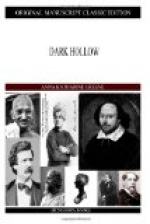After Mrs. Yardley’s departure, Mrs. Scoville, as she now expected herself to be called, sat for a long time brooding. Would her quest be facilitated or irretrievably hindered by her presence in the judge’s house? She had that yet to learn. Meanwhile, there was one thing more to be accomplished. She set about it that evening.
Veiled, but in black now, she went into town. Getting down at the corner of Colburn Avenue and Perry Street, she walked a short distance on Perry, then rang the bell of an attractive-looking house of moderate dimensions. Being admitted, she asked to see Mr. Black, and for an hour sat in close conversation with him. Then she took a trolley-car which carried her into the suburbs. When she alighted, it was unusually late for a woman to be out alone; but she had very little physical fear, and walked on steadily enough for a block or two till she came to a corner, where a high fence loomed forbiddingly between her and a house so dark that it was impossible to distinguish between its chimneys and the encompassing trees whose swaying tops could be heard swishing about uneasily in the keen night air. An eerie accompaniment, this latter, to the beating of Deborah’s heart already throbbing with anticipation and keyed to an unusual pitch by her own daring.
Was she quite alone in the seemingly quiet street? She could hear no one, see no one. A lamp burned in front of Miss Weeks’ small house, but the road it illumined (I speak of the one running down to the ravine) showed only darkened houses.
She had left the corner and was passing the gate of the Ostrander homestead, when she heard, coming from some distant point within, a low and peculiar sound which held her immovable for a moment, then sent her on shuddering.
It was the sound of hammering.
What is there in a rat-tat-tat in the dead of night which rouses the imagination and fills the mind with suggestions which we had rather not harbour when in the dark and alone? Deborah Scoville was not superstitious, but she had keen senses and mercurial spirits and was easily moved by suggestion.
Hearing this sound and locating it where she did, she remembered, with a quick inner disturbance, that the judge’s house held a secret; a secret of such import to its owner that the dying Bela had sought to preserve it at the cost of his life.
Oh, she had heard all about that! The gossip at Claymore Inn had been great, and nothing had been spared her curiosity. There was something in this house which it behooved the judge to secrete from sight yet more completely before her own and Reuther’s entrance, and he was at work upon it now, hammering with his own hand while other persons slept! No wonder she edged her way along the fence with a shrinking, yet persistent, step. She was circling her future home and that house held a mystery.
And yet, like any other imaginative person under a stress of aroused feeling, she might very easily be magnifying some commonplace act into one of terrifying possibilities. One can hammer very innocently in his own house, even at night, when making preparations to receive fresh inmates after many years of household neglect.




